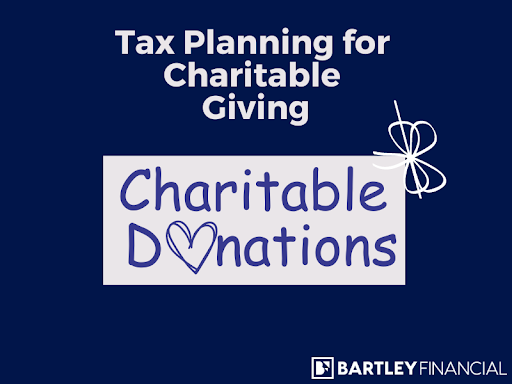As co-chair of the Easterseals VIP campaign this year, I was asked about charitable giving and tax benefits at a recent event. I thought I would share some charitable tax planning ideas and make a final pitch for Easterseals VIP. We will be wrapping up the VIP campaign on June 19th.
We are proud, longtime supporters of Easterseals of NH and VT. Easterseals has been very important to me and Bartley Financial for years.
Easterseals provides too many services to note. We have highlighted several on the Bartley Financial VIP Campaign website. A link to the donation page is there or you can click HERE to donate.
Please consider a tax deductible donation to the Easterseals VIP campaign, I would greatly appreciate it! And thank you for reading my pitch and if you have already made a donation. I am appreciative of your time and consideration. THANK YOU!
Now to tax savings ideas…
Tax Planning for Charitable Giving
Qualified Charitable Distributions (QCDs)
If you are age 70 ½ or older, QCDs are a great tax savings opportunity. If you have significant money in retirement accounts, you can distribute money from your IRAs to a charity tax-free. Why would you do this?
- Before your Required Minimum Distribution (RMD) date (here is a good article on your RMD start age)
- You have significant money in your IRAs that you may not spend in your lifetime, and
- You are not itemizing deductions on your tax return and will not get a tax deduction for a charitable contribution from your bank account.
- You want to reduce your RMDs when you have to start taking them in a future year.
- Multigenerational tax planning – you want to reduce your IRA accounts before your non-IRA accounts to save your heirs from paying the taxes when they inherit. (Note: non-IRA’s get a step-up in basis when you pass, so your heirs receive these assets tax-free.)
- Any inheritance is great, but IRA accounts are the most taxing to your heirs.
- Win-win – you achieve your charitable giving goals while ultimately saving your heirs taxes.
- After your Required Minimum Distribution (RMD) date (can be a no-brainer)
- All the reasons stated above PLUS you reduce your own taxes by reducing the amount of your RMDs that are taxed.
- By reducing RMD income, you can also reduce your Medicare Part B premiums in future years.
Here are a couple of previous articles that Bartley Financial wrote about QCDs – 2024 QCD limits, etc. and Tax Savings with QCDs
Gifting Appreciated Stock
Similar to QCDs with RMDs, gifting appreciated stocks is a no brainer. Gifting appreciated stock is a great way to reduce your exposure to stocks that you have owned for a while that have grown to a large percentage of your portfolio. Oftentimes, these are stocks that you are reluctant to sell due to the high tax cost.
Rather than selling the stock, gift it to an IRS qualified charity. This is truly a win-win-win-win-win (yes that is 5 wins!).
- Win # 1 – You reduce your exposure to the stock in your portfolio
- Win # 2 – You don’t have to pay taxes when you reduce your stock exposure
- Win # 3 – You get a tax deduction for the FULL fair market value of the stock (not limited to your cost of the shares)
- Win # 4 – The charity gets a gift
- Win # 5 – The charity does not have to pay taxes when they sell the stock due to their tax-exempt status
A limitation you may run into for receiving a tax deduction is if you do not itemize deductions on your tax return. Not to worry, we have previously written about how you can Group Your Itemized Deductions for Real Tax Savings and/or contribute the appreciated stock to a Donor Advised Fund (DAF).The benefit of a DAF is that you can load it up in one year to get a sizeable tax deduction and use it for multiple years to dole out to your favorite charities.
Here are also a couple of good articles on donating appreciated stock by two custodians that we use for our clients – Fidelity and Schwab.
The charitable planning described above can get a bit complex when you are weaving it into your overall planning goals. I/we are here to help and answer questions you have. I personally work with a lot of nonprofits to assist their donors with this type of planning at no cost to the donor. PLEASE don’t hesitate to contact me with any questions.
Need Help?
Bartley Financial is built around a client-first ethos. We are as committed to exhibiting high levels of professionalism as we are to building relationships with clients built on trust and mutual respect. That’s why we hold ourselves to a fiduciary standard. It’s also why we offer a transparent, fee-only compensation structure so that our clients never need to be concerned about a conflict of interest.
Bartley Financial has an experienced team of CPAs and CFPs® (Certified Financial Planners®) dedicated to helping clients manage their investment portfolios, plan for retirement, strategize taxes, or execute any other initiatives in pursuit of optimum financial health and minimal financial stress. From our offices in Andover, MA, and Bedford, NH, we work to ease clients’ financial concerns, strengthen their portfolios, and assuage their worry that they don’t know what they don’t know.
Contact us today to begin a relationship with a team of knowledgeable, trustworthy professionals who put their clients first.
By Robert Bartley
Robert (“Bob”) is a Certified Public Accountant (CPA) and a CERTIFIED FINANCIAL PLANNER (CFP®). He is a Summa Cum Laude graduate of Merrimack College and a Presidential Scholar. He has over 30 years of business experience and over 20 years of experience as owner of Bartley Financial.

